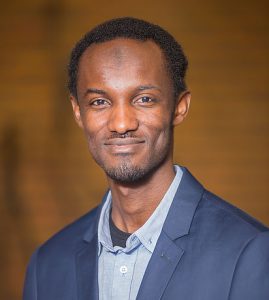
Mahmoud Bukar Maina
University of Sussex, United Kingdom
Anthropological evidence puts Africa as one of the earliest hubs for innovations in science and technology. The majority of the people in Africa are not aware of this history. Instead, they harbour a high level of cultural and religious misconception about science. For instance, in Nigeria – Africa’s most populous nation, science literacy has been estimated to be below 10%. Activities that inspire students to develop an interest in science careers and develop innovative science ideas are limited. As a result, many students never develop a real passion in science and most of those that end up pursuing science courses at the undergraduate and postgraduate level become less curious and innovative.
Moreover, young students lack science role models due to the poor visibility of scientists. This makes students to develop misconceptions about scientists, partly making them less interested in becoming scientists. The low visibility of scientists and their poor participation in public discourse also contributes to inadequate funding for science education and research. As a result, many look to the West to solve their local science-related problems.
Outreach Programme in Africa
African researchers need to get involved in changing people’s attitude about science, encouraging better policies for science education and research and inspiring the next generation of scientists from the continent. This will not only help in enhancing the visibility of their research; it will make them role models. Importantly, it would enable students and the public to appreciate the diversity in science – anyone can do science, and it does not have a colour. With this in mind, in 2013, I founded an outreach programme for the higher education NGO – TReND in Africa, and recently, Science Communication Hub Nigeria. These projects connect local scientists to students through outreach activities and online platforms. For example, during outreach events, students learn about science through fun, innovative and straightforward hands-on experiments. To sustain interest stimulated in students, we provide training to science teachers to improve their science teaching and practical skills. This is helping to create a collaboration between scientists and science teachers with an impact on science curricular and stimulating more aspiring scientists about science. We organise science radio programmes and science festivals to inspire and inform the public about science and dispel their science misconceptions.
The outreach team
TReND organises at least one summer school in Neuroscience, Open Source and/or other areas of natural sciences. A component of outreach is incorporated into the summer school to encourage participants to get involved. Many of these alumni join the outreach team. Presently, we have over 90 scientists across Africa affiliated to the outreach programme. To date, we have run several dozens of events in many countries, including Nigeria, Uganda, Tanzania, Kenya, Zimbabwe and Ghana, through which we have inspired, informed and connected thousands to science/scientists in Africa. We have created ambassador programmes, through which alumni of these activities receive long-term mentorship to guide their scientific journeys. Feedback gathered in the past six years, continues to reveal the success of this programme and an overwhelming interest in more activities.
Creating a partnership between scientists and journalists
To achieve a longterm impact, especially on science funding for education and research, scientists and journalists in Africa most work together in communicating and raising the profile of good local scientific research and its importance to the public. To this end, we have recently received a Wellcome Trust Grant in partnership with the University of Sussex, and the Francis Crick Institute to trial building a strong network where journalists and scientists in Nigeria will form a long-term partnership that would facilitate and sustain engagements that promote public understanding, trust and support for science. We will train at least 70 scientists and journalists and pair them to develop science contents on ongoing local research. This will hopefully multiply the impact of our outreach project and take it to a new level.
Overall, I am excited about our success thus far. For example; 1) To date we have organised over a hundred activities across Africa, in which we have engaged dozens of politicians and government officials, inspired over three thousand students in-person and trained over a hundred science teachers. 2) We continue to provide mentorship to over a hundred students/teachers we engaged, in-person and via online platforms. 3) We have facilitated partnerships between TReND and many higher institutions. This has led to the establishment of international level laboratories, e.g. The establishment of Neuroscience laboratory in Gombe State University, Nigeria. 4) More African scientists actively engaged in research continue to join the outreach programme, and as a result, our activities continue to expand across Africa. Our major goal is to inspire the future generation of scientists, enhance public understanding, trust and support for science in Africa, which among other things, would allow African scientists to engage in international level research within African laboratories. This is why I am particularly optimistic about the partnership we are trialling between scientists and journalists in Nigeria, and hope to introduce in other African countries in the future. It will significantly broaden science engagement in Africa and facilitate an affirmative action by the public and the government. However, a significant constraint to achieving this goal is the shortage of funding. There are not many dedicated funds for science communication initiatives in Africa. Investment in such initiatives will fast track Africa’s rise as a science superpower eventually.
Dr Mahmoud Bukar Maina FRSA is a Research Fellow in Sussex Neuroscience, University of Sussex, UK. He serves as the Outreach Director for TReND in Africa (www.TReNDinAfrica.org) and founder of Science Communication Hub Nigeria (www.SciComNigeria.org). More about him https://en.wikipedia.org/